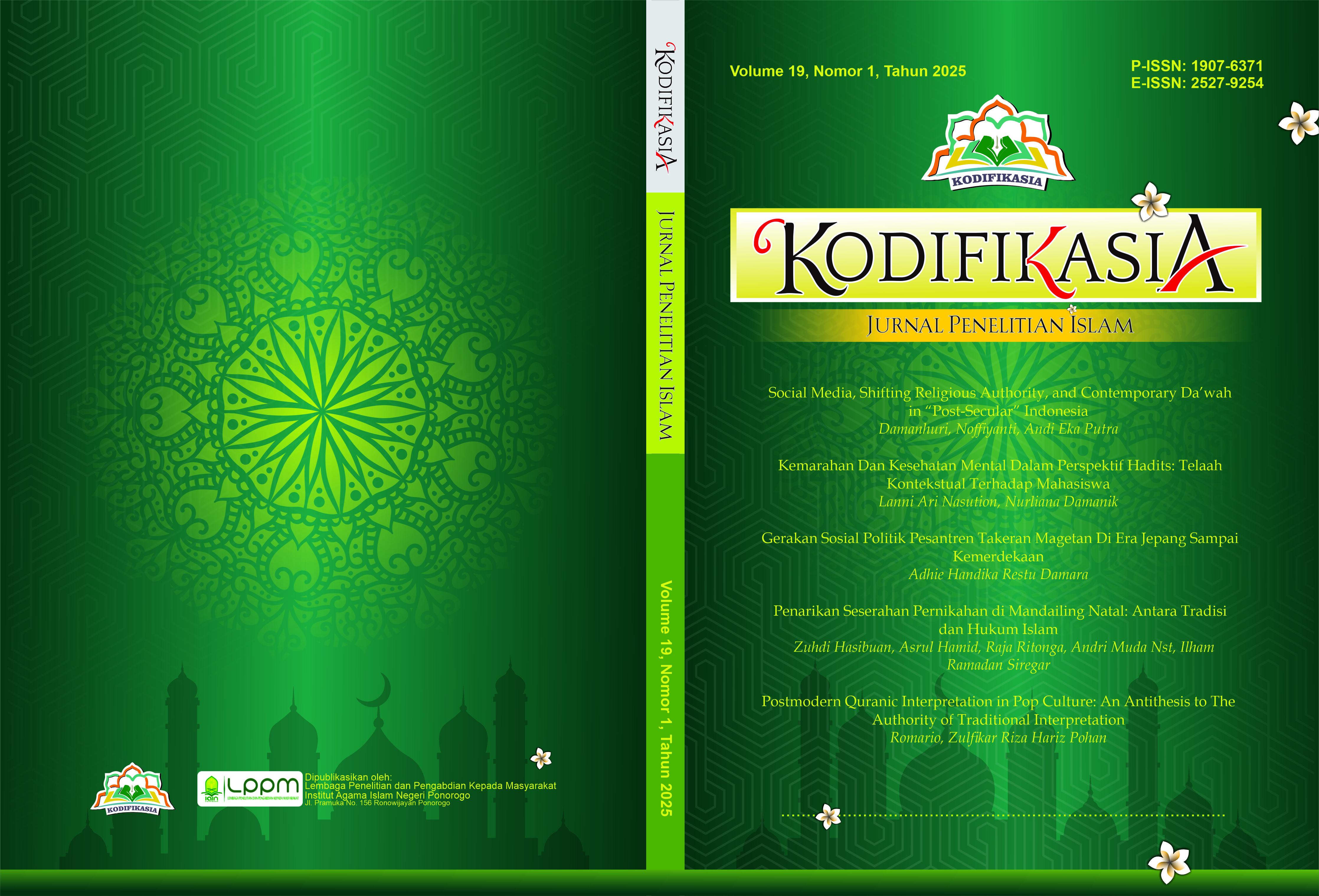Kemarahan Dan Kesehatan Mental Dalam Perspektif Hadits: Telaah Kontekstual Terhadap Mahasiswa
(STUDI KASUS MAHASISWA ILMU HADIS UIN SUMATERA UTARA)
Keywords:
angry, mental health, hadith, studentAbstract
Uncontrolled anger has a negative impact on mental health and reduce one's quality of life. Students, in particular, often face academic and social pressures that can trigger these emotions. In Islamic teachings, the hadith provides valuable guidance in managing emotions so as not to harm oneself or others. This study aims to investigate the relationship between anger and mental health from the perspective of the hadith teachings, focusing on students of the Hadith Study Program at the State Islamic University of North Sumatra. This study uses a qualitative approach with a case study method, where data are obtained through in-depth interviews and observations of five students who have a basic understanding of the hadith. The results of the study indicate that the hadith teachings on anger control, if understood and applied consistently, can reduce the negative impacts of these emotions such as stress, anxiety, and depression, and also improve students' mental well-being and social relations. The conclusion of this study underlines the importance of integrating the hadith teachings in character education and the development of emotional literacy among students. The practical implications are that the results of this study can be used as a reference in designing religious-based counseling guidance programs on campus, as well as encouraging the formation of educational policies that support mental health through an Islamic spiritual approach.
References
Al-’Abbad, ’Abd al-Muhsin bin Hamd bin ’Abd al-Muhsin bin ’Abdillah bin bin Hamd. Syarh Al-Arba’in Al-Nawawiyah. al-Maktabah al-Syamilah, 1432. http://www.islamweb.net.
Al-Hamwari, Saif. “Atsar Al-Ghadhab ’ala Al-Jism.” WebTeb, 2022. https://www.webteb.com/articles/اثار-الغضب-على-الجسم_25751.
Al-Islāmī, Taṣduru ‘an al-Muntadā. “Majallat Al-Bayān.” Majalah Ismaliyah, 1428.
Al-Islamiyah, al-Majlis al-A’la lisysyuun. “Mausu’atu Al-Mafahim Al-Ismaliyah Al-’Ammah.” Al-Maktabah Al-Syamilah, 1432.
An-Nawawi, Abu Zakariya Muhyiddin Yahya bin Syaraf. Al-Minhaj Syarah Shahih Muslim Ibn Al-Hajjaj. 2nd ed. Beirut: Daar Ihya’ at-Turats al-’Arabi, 1972.
Andini, Mutiara, Djumi Aprilia, and Primalita Putri Distina. “Kontribusi Psikoterapi Islam Bagi Kesehatan Mental.” Psychosophia: Journal of Psychology, Religion, and Humanity 3, no. 2 (2021): 165–87. https://doi.org/10.32923/psc.v3i2.2093.
Ath-Thabrani, Sulaiman bin Ahmad bin Ayyub bin Mathir al-Lakhmi asy-Syammi abu al-Qasim. Al-Mu’jam Al-Ausath. Edited by Abu Mu’adz Thariq and Abu al-Fadhl bin al-Muhsin Al-Husaini. Kairo: Daar al-Haramain, 1995.
Auroraningtyas, Ignasia Nunki. “Emosi Marah Pada Desainer Grafis Yang Mengalami Stres Kerja.” Widya Mandala Surabaya Catholic University, 2021.
Averill, James R. “Studies on Anger and Aggression: Implications for Theories of Emotion.” American Psychologist 38, no. 11 (1983): 1145–60. https://doi.org/10.1037/0003-066X.38.11.1145.
Baqi, Safiruddin Al. “Ekspresi Emosi Marah.” Buletin Psikologi 23, no. 1 (2015): 22. https://doi.org/10.22146/bpsi.10574.
Darmalaksana, Wahyudin. “Metode Penelitian Kualitatif Studi Pustaka Dan Studi Lapangan.” Pre-Print Digital Library UIN Sunan Gunung Djati Bandung, 2020, 1–6.
Darmawati. “Mengendalikan Marah Sesuai Tuntunan Rasulullah SAW.” uinsi.ac.id, 2024. https://www.uinsi.ac.id/2024/09/16/mengendalikan-marah-sesuai-tuntunan-rasulullah-saw/.
Dasman. AL-KUTUB AL-SITTAH Sejarah Dan Manhaj Kitab Shahih Al-Bukhari, Shahih Muslim, Sunan Al-Tirmidzi, Sunan Abu Dawud, Sunan Al-Nasa’i Dan Sunan Ibn Majah. Edited by Aminullah. I November. Jember: IAIN Jember Press, 2015.
Deffenbacher, Jerry L. “Angry College Student Drivers: Characteristics and a Test of State-Trait Theory.” Psicologia Conductual 11, no. 1 (2003): 163–76.
Diana, R. Rachmy. “Pengendalian Emosi Menurut Psikologi Islam.” Unisia 37, no. 82 (2015): 41–47. https://doi.org/10.20885/unisia.vol.37.iss82.art5.
Fuad, Ikhwan. “Menjaga Kesehatan Mental Perspektif Al-Qur’an Dan Hadits.” Journal An-Nafs: Kajian Penelitian Psikologi 1, no. 1 (2016): 31–50. https://doi.org/10.33367/psi.v1i1.245.
Gamayanti, Witrin, and Ila Nurlaila Hidayat. “Marah Dan Kualitas Hidup Orang Yang Mengalami Psikosomatik.” Jurnal Psikologi 18, no. 2 (2019): 177. https://doi.org/10.14710/jp.18.2.177-186.
Hanbal, Ahmad bin. Musnad Al-Imam Ahmad Bin HAnbal. Edited by Syu’aib Al-Arnauth, Dkk. ’Adil Mursyid, and disempurnakan oleh Dr. Abdullah bin Abdul Muhsin At-Turki. 1st ed. Beirut: Muassasah ar-Risalah, 2001.
Hasibuan, Bustomi Paisal. “HADIS TENTANG MARAH (TELA’AH ILMU MUKHTALIFAL-HADIS).” Universitas Islam Negeri Sultan Syarif Kasim Riau, 2015.
Hernawati, Lucia, and Haryo Goeritno. “Ekspresi Emosi Marah Remaja Ditinjau Dari Kepribadian Narsisistik Dan Usia.” Ekspresi Emosi Marah Remaja Ditinjau Dari Kepribadian Narsisistik Dan Usia. Semarang, 2014.
Husnaini, Rovi. “Hadis Mengendalikan Amarah Dalam Perspektif Psikologi.” Diroyah: Jurnaal Ilmu Hadis 4, no. 1 (2019): 79–88.
I, Hammydiati Azifa Lazuardini. “Relevansi Hadis Larangan Marah Dengan Kesehatan Mental.” AL QUDS : Jurnal Studi Alquran Dan Hadis 3, no. 1 (2019): 81. https://doi.org/10.29240/alquds.v3i1.610.
Isneni, Nilam. “Mengenal Ghadab, Sifat Tercela Yang Berdampak Negatif.” detikHikmah, 2023. https://www.detik.com/hikmah/khazanah/d-6657190/mengenal-ghadab-sifat-tercela-yang-berdampak-negatif#:~:text=Dampak Negatif Ghadab,tidak dapat berpikir secara rasional.
Jones, Douglas. Digital Marketing Strategy: A Framework for Success. John Wiley & Sons, 2013.
Julian, Robi Naufal. “Pengendalian Marah Perspektif Hadis: Studi Tematik Atas Hadis Dalam Kutub Al-Tis’ Ah.” UIN Sunan Gunung Djati Bandung, 2020.
Kamaluddin, Munawir. “Marah: Penyakit Hati Yang Mengancam Kesehatan Dan Keharmonisan.” uin-alauddin.ac.id, 2024. https://uin-alauddin.ac.id/tulisan/detail/marah--penyakit-hati-yang-mengancam-kesehatan-dan-keharmonisan-0724.
Malik, Ibnu Baththal Abu al-Hasan Ali bin Khalaf bin Abdul. Syarah Shahih Al-Bukhari Libni Baththal. Edited by Tahqiq Abu Yasir Tamim bin Ibrahim. 2nd ed. Riyadh: Maktabah ar-Rasyad, 2003.
Permana, Rizky Wahyu. “Ini Yang Terjadi Pada Tubuh Saat Sedang Marah.” merdeka.com, 2024. https://www.merdeka.com/sehat/ini-yang-terjadi-pada-tubuh-saat-sedang-marah-228854-mvk.html?page=4.
Ritonga, Asnil Aidah. “Maktabah Syamilah as an Information Seeking Tool for Higher Education in Islamic Studies.” Library Philosophy and Practice 9, no. 1 (2021). https://digitalcommons.unl.edu/libphilprac/6196/.
Rivers, Susan E., Marc A. Brackett, Nicole A. Katulak, and Peter Salovey. “Regulating Anger and Sadness: An Exploration of Discrete Emotions in Emotion Regulation.” Journal of Happiness Studies 8, no. 3 (2007): 393–427. https://doi.org/10.1007/s10902-006-9017-2.
Siregar, Gardenia Junissa, Rostiana Rostiana, and Heryanti Satyadi. “Peran Regulasi Emosi Terhadap Kualitas Hidup Dengan Work Life Balance Sebagai Mediator Pada Perempuan Peran Ganda.” Jurnal Muara Ilmu Sosial, Humaniora, Dan Seni 3, no. 2 (2019): 403. https://doi.org/10.24912/jmishumsen.v3i2.5551.
Syuhbah, Muhammad Muhammad Abu. Al-Kutub Al-Sittah. Kairo: Majmu al-Buhuts alIslamiyyah, 1969.
Wigati, Indah. “Teori Kompensasi Marah Dalam Perspektif Psikologi Islam.” Ta’dib XVIII, no. 02 (2013): 193–214.
Downloads
Published
Issue
Section
License
Copyright (c) 2025 Lanni Ari Nasution, Nurliana Damanik

This work is licensed under a Creative Commons Attribution-ShareAlike 4.0 International License.








